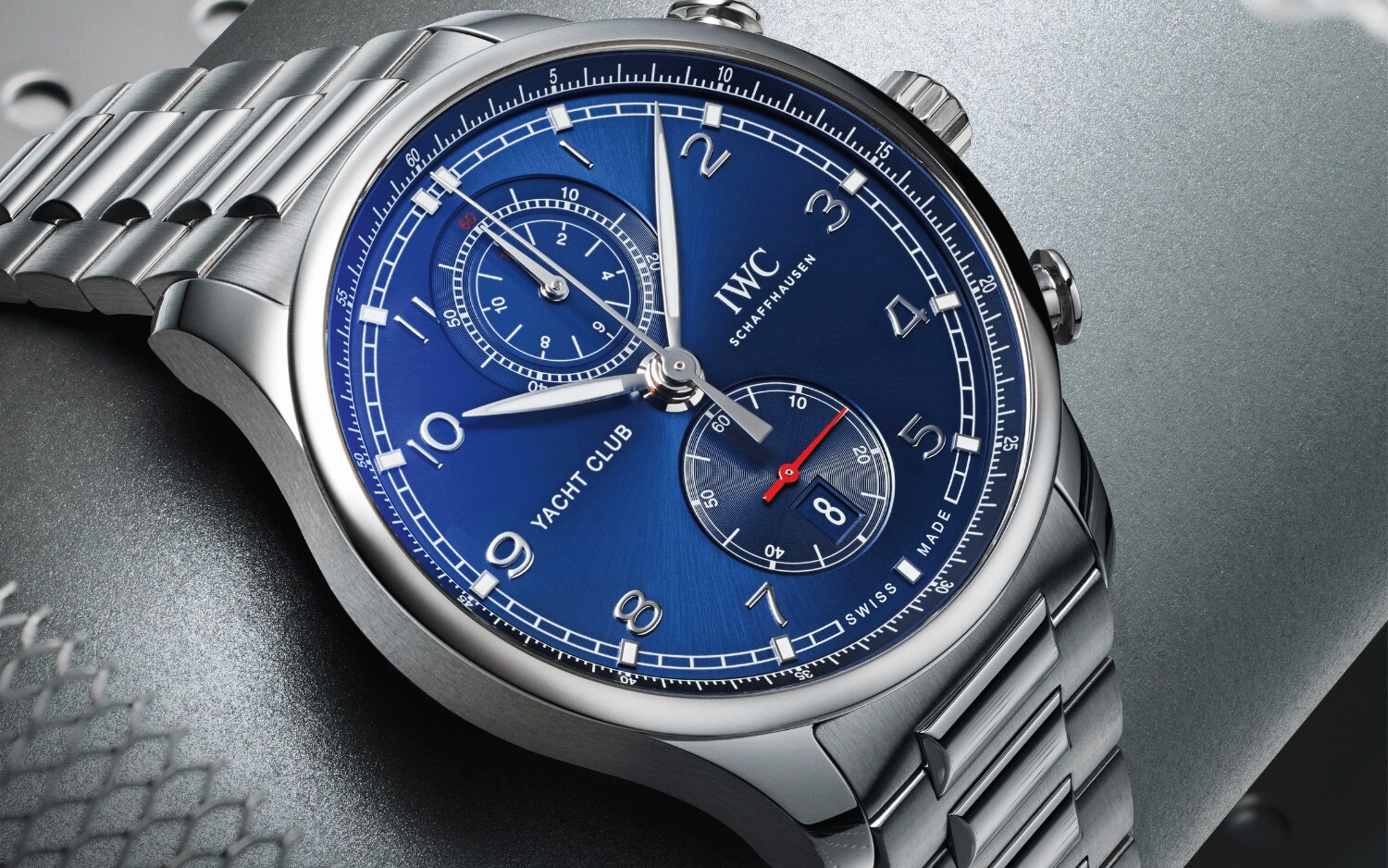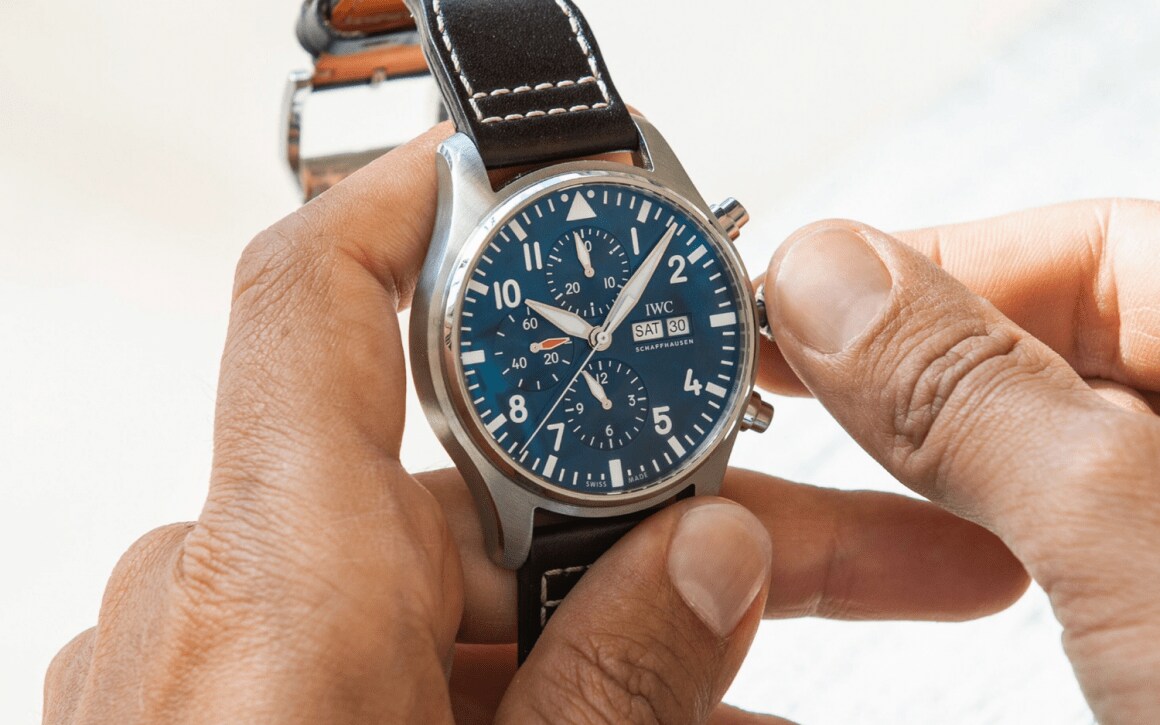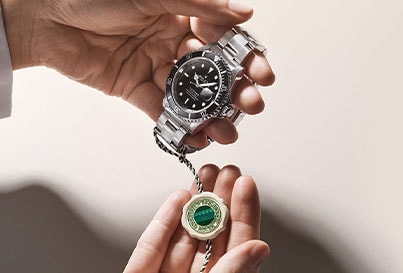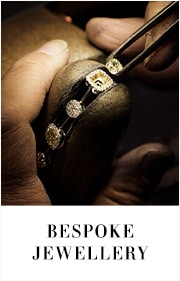The Calibre Complete Guide To IWC Schaffhausen
By Sarah Jayne Potter | 7 minute read

When American entrepreneurial spirit collided with the masterful talents of Swiss watchmaking, the result led to one of the world’s most celebrated watch manufacturers, IWC Schaffhausen.
Founded over 150 years ago, in 1868 by Florentine Ariosto Jones, IWC began a legacy in using a strong foundation of technology and development to create precision timepieces. Its innate sense of beauty within innovation is reflective of the manufacturer’s location: on the peaceful banks of the Rhine River, Schaffhausen is a little way up from the cascading Rhine Falls. This locale has also helped define the company’s motto Probus Scafusia, which is a Latin phrase for “good, solid craftsmanship from Schaffhausen”.
Watchmaking is truly an art at IWC, as precision engineering harmonises with exquisite design. Watchmakers here are highly skilled masters of the craft, and their ingenuity has led to the creation of in-house complications and movements such as the tourbillon, perpetual calendar, and minute repeater.
The pioneering spirit of its founder remains true to this day, having been recognised as the watchmaking industry’s pioneers of environmental protection and sustainability. Alongside this, the brand has several impressive partnerships with entities such as Tottenham Hotspur, Spitfire, and the Mercedes-AMG Petronas Formula One Team.
In this guide to IWC Schaffhausen we explore the story behind the maison, its iconic collections, and our team’s favoured timepieces.
The story of IWC Schaffhausen
The story of IWC Schaffhausen is as complex and rich as the timepieces crafted in their atelier, and its success can be punctuated by the many fearless innovators who, at one time, steered its reins.
American engineer and watchmaker Florentine Ariosto Jones founded the International Watch Company in 1868, instilling a unique pioneering spirit that, when combined with the meticulous engineering of Swiss luxury watchmakers, made for a unique offering.
Settling along the breathtaking banks of the River Rhine, Jones called on the expertise of qualified Swiss watchmakers – and their modern technology – to manufacture high-quality pocket watches. During this period in Switzerland, wages were low and skilled watchmaking took place in people’s homes as opposed to a workshop. Despite initial reluctance from the townspeople of Schaffhausen, Jones met with watch manufacturer and industrialist Heinrich Moser to create the only watch manufacturers in north-eastern Switzerland: The International Watch Company in Schaffhausen. Here they would bring together a multitude of talents and house all the watchmakers under one roof.
When he decided to return to the United States, the Rauschenbachs family took over the company and started to produce wristwatches for men and women too. Following the death of Johannes Rauschenbach-Schenk, Ernst Jakob Homberger took over and under his leadership two iconic IWC collections were established: Pilot’s Watches and the Portugieser. A few years later, the first Aquatimer was launched and began the heralded legacy of IWC diver’s watches.
The period before and after the First and Second World Wars was an interesting time for IWC. Hans Ernst Homberger was now in charge and had set up a number of social institutions for factory employees. In 1949 he founded the Watch Company Welfare Foundation. The company also found itself, post WW2, with the opportunity to establish and revive relationships with other countries across Europe, as well as America and Australia, leading to even more innovation.
The Quartz Crisis of the 1970s and 80s inspired IWC to turn its attention to what it knew best: creating art through masterful watchmaking. During this period, the world’s first watch case made from titanium was created and began their legacy of expertise in utilising different materials within their timepieces. A significant milestone in the IWC story came in the mid-1980s when legendary watchmaker Kurt Klaus included the perpetual calendar within the Da Vinci collection.
In 2001, IWC became part of Richemont, a Switzerland-based luxury goods holding company whose brands include Cartier, Officine Panerai, and Roger Dubuis. Since then the innovations continued to flourish, with precision engineering leading to a double moon display being added to the Portugieser’s perpetual calendar, and the introduction of the Aquatimer’s rotating bezel. And, rather poetically, in homage to Florentine Ariosto Jones, the annual calendar complication was updated to show the format – month, date, and day – as used in the founder’s home country, the United States.

The Pilot’s Watches
From paying tribute to the pioneering spirit of the Spitfire, to the effortlessly cool Top Gun collection, IWC’s pilot’s watches are a feat of precision and technology. The typical aesthetic of a pilot’s watch started with IWC and the introduction of a white triangle at the 12 o’clock position. This was to allow pilot’s the ability to read the position of the hands with just a glance.
1936 saw the start of it all, with the robust Special Watch for Pilots produced for civil aviation. Thanks to state-of-the-art engineering it did not take long for the collection’s ingenuity to earn it global recognition. Nowadays the striking design of black dials and luminescent displays, reminiscent of a cockpit, add to the heritage and make it one of the brand’s most highly regarded collections.
Portofino
The Portofino takes inspiration from its namesake and embodies the laid-back lifestyle of the Mediterranean. Since 1984, the Portofino collection has been an enduring success, popular with men and women owing to its refined aesthetic. An uncluttered dial, simple hour markers, and slim hands alongside, of course, roman numerals, has established it as a timepiece of elegance.
Notable models from the collection include the 1984 Portofino Hand Wound Moon-phase, with a round, gold case, and the Automatic 37 that included the collection’s much-revered complications in a smaller case.
Ingenieur
As an homage to engineering it comes as no surprise that the Ingenieur collection is synonymous with motorsport. Infact, the materials typically used in creating race cars – such as ceramic and titanium – can be found in these timepieces too.
Polished stainless steel helps provide the characteristic rugged charm of the collection. However, the real beauty can be found in the innovation. First created in 1955, Ingenieur featured the most advanced winding mechanism of the time. Nowadays the advancements are meticulously incremental, for example a wearer is now able to adjust the length of the strap with one hand and a single button.

Portugieser
When two Portuguese businessmen commissioned IWC to craft a highly accurate wristwatch with the precision of a marine chronometer, little did they know they were about to establish the most iconic collection of not only the brand, but of Swiss haute horology too.
Launched in 1939, the Portugieser features simple Arabic numerals and a railway-track-style chapter ring, the latter of which is divided into one-minute sections and blends seamlessly with the dial.
Da Vinci
There is only one word that can accurately summarise the Da Vinci collection, and that is ‘exquisite’. As expected, it is named after Leonardo Da Vinci who inspired the pairing of elegant design and meticulous complications.
Established in 1969, the Da Vinci Quartz Electronic featured the first Swiss-made quartz movement. Since then, the collection has evolved to include sophisticated round cases, as seen in the Da Vinci Lady Chronograph and Da Vinci Tourbillon Rétrograde Chronograph, but the characteristic strap horns and curved lugs – admired for their feminine beauty – remain.
Aquatimer
The Aquatimer was the collection that started it all in terms of IWC’s development and production of professional diver’s watches. Inspired by the legendary marine conservationist Jacques-Yves Cousteau, the collection features a sealing system for ultimate water protection, as well as the patented bracelet quick-change technology that allows the wearer to change from a steel bracelet to a rubber strap, and vice versa, instantly.
Nowadays, the Aquatimer continues to evolve with technology, with its latest incarnation reaping the benefits of Ceratanium. This newly developed material features the sturdiness of ceramic with the lightness of titanium, and the Aquatimer Perpetual Calendar Digital Date-Month Edition “50 Years Aquatimer” is the first timepiece to use it.
Our Buyer’s Highlights
“The Spitfire chronograph introduced at a 41mm case size is still built to inspire robustness in a simplistic form. With brushed surfaces, the lines are simple and have a vintage touch with colourways that were inspired by the Spitfire’s cockpit. For the first time ever, it presents a movement from the 69000-calibre family which ensure this timepiece is as modern as it is functional.” Lisa Broun, Senior Luxury Watch Buyer
“Since 1988, the Portofino Chronograph has had a firm place in IWCs repertoire and it is no wonder why. A timeless classic with its uncluttered and restrained design that lands itself between dressy and sporty thanks to the chronograph function. A must have for any collection.” Lisa Broun, Senior Luxury Watch Buyer
“One of the most successful Portugieser models to ever be produced in Schaffhausen, the balanced design retains the classic appeal of the legendary original Portugieser that was first manufactured in the 1930s. The twin barrels are the trademark feature of this movement that supplies the energy for the 7-day power reserve that is a proud feature on the dial of this timepiece.” Lisa Broun, Senior Luxury Watch Buyer
To ensure your IWC Schaffhausen watch stays in exquisite condition, take a look at the tips for taking care of your luxury timepiece.





